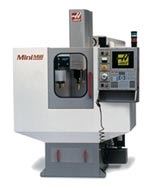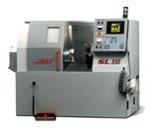Machining The Majority Of Job Shop Parts
This builder has introduced a compact vertical machining center and a compact lathe, both with the same full CNC functionality as larger machines.
Share


In a typical job shop, most of the CNC machines have capacity going to waste most of the time. Look to any of the vertical machining centers in your own shop, and you may see the reason why. Chances are, the job set up on that machine right now doesn’t come close to demanding all of the available travels.
And CNC lathes tell a similar story. Usually, the part takes up only a portion of the maximum possible workpiece diameter.
So why are these oversize machines used for the work? Simple. One reason is that standard-size CNC machine tools are larger than standard-size jobs. Another reason is that orders for bigger parts sometimes do come in . . . and when they do, a shop that makes its living on contract work has to be ready for them.
But when it comes to making the best use of a shop’s available capital, an important consideration is just how often the shop does see these jobs that are large enough to take advantage of a standard-size machine. If the answer is “not all the time,” then the next CNC machine tool the shop purchases may not need to have so much capacity. Instead, those larger jobs can be assigned to an existing, standard-size machine, while the shop saves money by making the next machine it buys more compact. This machine can let the shop increase its capacity to handle just the smaller, more typical parts.
That’s the thinking behind two new machines from Haas Automation (Oxnard, California). The builder has introduced a compact vertical machining center and a compact lathe, both with the same full CNC functionality as larger machines.
The VMC, called “Mini Mill,” features a footprint of about 5 feet by 6 feet, for a machine with XYZ travels of 16 by 12 by 10 inches. Peak spindle rating (three-phase) is 10 hp.
The lathe, called SL-10, has a comparable footprint of 6 feet by 4 feet. Its chuck capacity is 8 inches, bar capacity is 2 inches, and maximum workpiece dimensions are 10.5-inch diameter by 14 inches long. Peak spindle rating is 15 hp.
The small machines can also allow CNC machining capacity to be expanded in shops where floorspace is critically limited. However, in addition to established CNC shops, there is another type of machine shop that a compact CNC machine may benefit. The small price means the machine may be a good fit for some of the smallest shops—particularly those currently not using CNC, or using it only in a limited capacity. A compact machine may offer an easy way to step up to full CNC capability.
This is particularly true in the case of machining center work. The Haas VMC is priced at $29,900. (Price for the lathe is $39,900.) So where a small shop may be preparing itself to commit both capital and floorspace to its next programmable knee mill, for example . . . a small CNC machining center might make a reasonable alternative. MMS
Related Content
Workholding Fixtures Save Over 4,500 Hours of Labor Annually
All World Machinery Supply designs each fixture to minimize the number of operations, resulting in reduced handling and idle spindle time.
Read MoreShop Tour Video: You've Never Seen a Manufacturing Facility Like This
Explore Marathon Precision’s multi-process approach to manufacturing, where blacksmiths and hand-forged dies meet state-of-the-art CNC machining. Discover how restoring classic muscle cars and building custom art projects creates a dynamic shop culture — and draws top talent to this unique and innovative metalworking facility.
Read MoreLessons That Matter for the Future of Automated Job Shops
The Automated Shop Conference (TASC, August 12–13) is designed for job shop leaders looking to implement automation in practical, high-impact ways — from lights-out machining to AI-driven programming and front-office integration. Here are 10 standout sessions led by shop owners, engineers and innovators who are pushing automation forward without massive budgets or unrealistic expectations.
Read MoreHow Proper Scheduling Leads to a Successful Machine Shop
Proper scheduling of jobs is paramount when it comes to running an efficient machine shop.
Read MoreRead Next
OEM Tour Video: Lean Manufacturing for Measurement and Metrology
How can a facility that requires manual work for some long-standing parts be made more efficient? Join us as we look inside The L. S. Starrett Company’s headquarters in Athol, Massachusetts, and see how this long-established OEM is updating its processes.
Read More

















-02.jpg;maxWidth=300;quality=90)





.png;maxWidth=300;quality=90)





